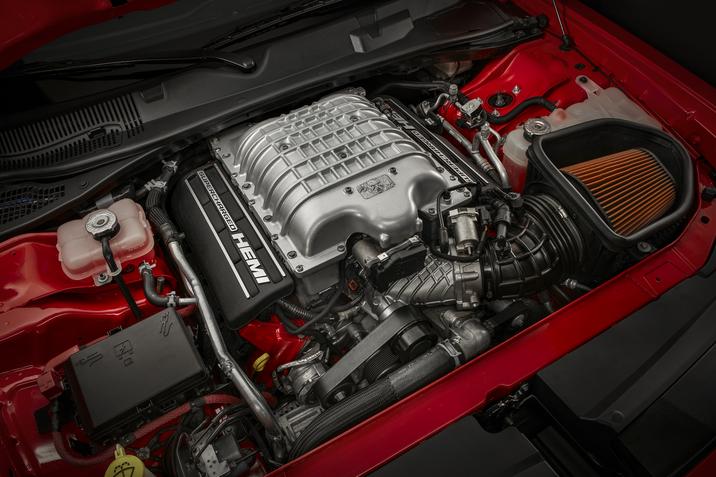FCA Faces $79 Million Fine Over U.S. Fuel Economy Shortfall

Fiat Chrysler Automobiles is facing a $79 million civil penalty over its inability to adhere to fuel economy requirements in 2017. Considering the automaker was already hit with a $77 million fine for 2016 model year requirements, the announcement is not unexpected. FCA’s domestic lineup is also loaded with large vehicles featuring sizable motors, a status quo it hopes to offset by buying carbon credits from Tesla.
In fact, the company appears to be taking a wait-and-see approach in regard to pursuing greener automobiles. While it continues to maintain its $10 billion commitment through 2022, aimed at delivering more hybrid and electric vehicles, the automaker’s established strategy involves eating whatever penalties it incurs via federal economy requirements or attempting to pay them off in advance.
Frankly, it might be a more cost-effective way to run the company — as it allows the automaker to continue leveraging older models (cough, Dodge). It’s not like people aren’t buying them… though perhaps not in the same numbers FCA originally claimed. The development of electric vehicles also requires quite a bit of cash, with little promise of recouping those funds through sales. Simply paying emission fines could give the company more time to fine-tune its hybrid and electric models while also minimizing the amount of money it has to invest during an uncertain period for the auto industry.
Then again, FCA could be strategizing itself into obsolescence by not pursuing electrification quite so aggressively as some of its rivals. However, plenty of them are also buying emission credits and taking it easier with electrification.
The Department of Transportation’s report came out on Tuesday, noting that Fiat Chrysler had failed to meet the standards set for 2017. While the report has since been taken down (likely temporarily), FCA confirmed it was notified, adding that it has 60 days to respond.
[Image: FCA]

A staunch consumer advocate tracking industry trends and regulation. Before joining TTAC, Matt spent a decade working for marketing and research firms based in NYC. Clients included several of the world’s largest automakers, global tire brands, and aftermarket part suppliers. Dissatisfied with the corporate world and resentful of having to wear suits everyday, he pivoted to writing about cars. Since then, that man has become an ardent supporter of the right-to-repair movement, been interviewed on the auto industry by national radio broadcasts, driven more rental cars than anyone ever should, participated in amateur rallying events, and received the requisite minimum training as sanctioned by the SCCA. Handy with a wrench, Matt grew up surrounded by Detroit auto workers and managed to get a pizza delivery job before he was legally eligible. He later found himself driving box trucks through Manhattan, guaranteeing future sympathy for actual truckers. He continues to conduct research pertaining to the automotive sector as an independent contractor and has since moved back to his native Michigan, closer to where the cars are born. A contrarian, Matt claims to prefer understeer — stating that front and all-wheel drive vehicles cater best to his driving style.
More by Matt Posky
Latest Car Reviews
Read moreLatest Product Reviews
Read moreRecent Comments
- Jeanbaptiste 2022 Tesla model 3 performance ~35000 miles tires - ~$1000ish. Several cabin filters ~$50
- El scotto No rag-top, no rag-top(s) = not a prestigious car brand. Think it through. All of the high-end Germans and Lexus have rag-tops. Corvette is really its own brand.World-leading engines. AMG, M, S and well Lexus is third-world tough. GM makes one of the best V-8s in the world in Bowling Green. But nooooo, noooo, we're GM only Corvettes get Corvette engines. Balderdash! I say. Put Corvette engines in the top-tier Cadillacs. I know GM could make a world-class 3.5 liter V-6 but they don't or won't. In the interior everything that gets touched, including your butt, has to feel good. No exceptions.Some think that those who pay above MSRP and brag about it are idiots. Go the opposite direction, and offer an extended 10-year 100,000-mile factory warranty. At a reasonable price. That's Acura's current business model.
- Carrera 2014 Toyota Corolla with 192,000 miles bought new. Oil changes every 5,000 miles, 1 coolant flush, and a bunch of air filters and in cabin air filters, and wipers. On my 4th set of tires.Original brake pads ( manual transmission), original spark plugs. Nothing else...it's a Toyota. Did most of oil changes either free at Toyota or myself. Also 3 batteries.2022 Acura TLX A-Spec AWD 13,000 miles now but bought new.Two oil changes...2006 Hyundai Elantra gifted from a colleague with 318,000 when I got it, and 335,000 now. It needed some TLC. A set of cheap Chinese tires ($275), AC compressor, evaporator, expansion valve package ( $290) , two TYC headlights $120, one battery ( $95), two oil changes, air filters, Denso alternator ( $185), coolant, and labor for AC job ( $200).
- Mike-NB2 This is a mostly uninformed vote, but I'll go with the Mazda 3 too.I haven't driven a new Civic, so I can't say anything about it, but two weeks ago I had a 2023 Corolla as a rental. While I can understand why so many people buy these, I was surprised at how bad the CVT is. Many rentals I've driven have a CVT and while I know it has one and can tell, they aren't usually too bad. I'd never own a car with a CVT, but I can live with one as a rental. But the Corolla's CVT was terrible. It was like it screamed "CVT!" the whole time. On the highway with cruise control on, I could feel it adjusting to track the set speed. Passing on the highway (two-lane) was risky. The engine isn't under-powered, but the CVT makes it seem that way.A minor complaint is about the steering. It's waaaay over-assisted. At low speeds, it's like a 70s LTD with one-finger effort. Maybe that's deliberate though, given the Corolla's demographic.
- Mike-NB2 2019 Ranger - 30,000 miles / 50,000 km. Nothing but oil changes. Original tires are being replaced a week from Wednesday. (Not all that mileage is on the original A/S tires. I put dedicated winter rims/tires on it every winter.)2024 - Golf R - 1700 miles / 2800 km. Not really broken in yet. Nothing but gas in the tank.


































Comments
Join the conversation
I see the trolls who love to identify with the world's worst people and companies have latched on to FCA. It's laughable because there's no strategy or politics to this situation. Chrysler is exactly the same company it has always been, generation after generation: the also-ran of the Detroit Three, milking obsolete platforms for the last penny, balancing its reputation for cheap interiors and poor reliability with a knack for carving out a niche with fun colors and cheap horsepower, often having good ideas but rarely having the money to develop them properly (behold the brilliant but unreliable Pacifica Hybrid, with its habit of becoming engulfed in flames), and somehow managing to come back from the brink every time through pluck or luck (K-cars, the SUV craze). No strategy here other than making it to next quarter in one piece, long term be damned.
This is simply a $79 million tax.